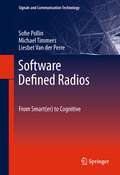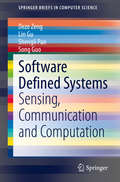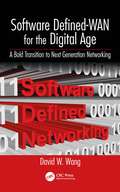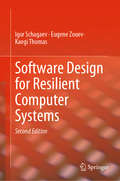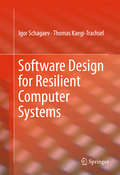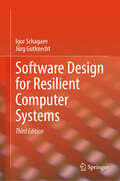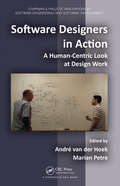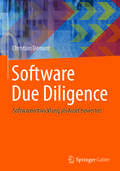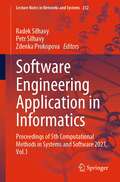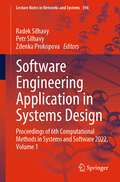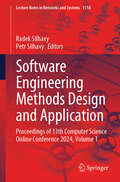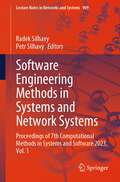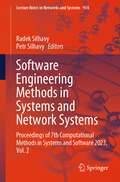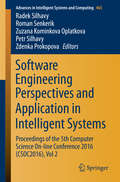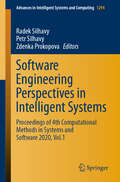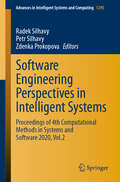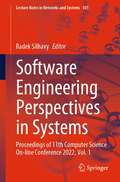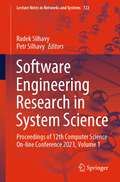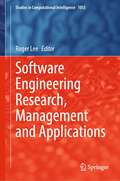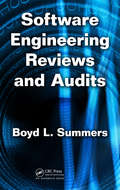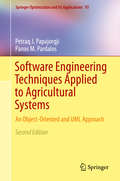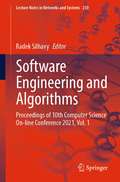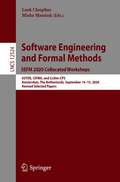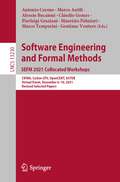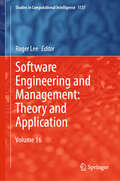- Table View
- List View
Software Defined Radios
by Michael Timmers Sofie Pollin Liesbet Van der PerreMany and ever more mobile users wish to enjoy a variety of multimedia services, in very diverse geographical environments. The growing number of communication options within and across wireless standards is accommodating the growing volume and heterogeneity in wireless wishes. On the other hand, advancement in radio technologies opening much more flexibility, a.o. through Software Defined Radios, opens up the possibility to realize mobile devices featuring multi-mode options at low cost and interesting form factors. It is crucial to manage the new degrees of freedom opened up in radios and standards in a smart way, such that the required service is offered at satisfactory quality as efficiently as possible. Efficiency in energy consumption is clearly primordial for battery powered mobile terminals specifically, and in the context of growing ecological concerns in a broader context. Moreover, efficient usage of the spectrum is a growing prerequisite for wireless systems, and coexistence of different standards puts overall throughput at risk. The management of flexibility risks bringing about intolerable complexity and hamper the desired agility. A systematic approach, consisting of anticipative preparing for smooth operation, allows mastering this challenge. Case studies show that already today, this approach enables smart operation of radios realizing impressive efficiency gains without hampering Quality-of-Service. In the future wireless communication scenes will be able to profit form the opening of the spectrum. Even smarter and cognitive behavior will become possible and essential.
Software Defined Systems: Sensing, Communication and Computation (SpringerBriefs in Computer Science)
by Song Guo Deze Zeng Lin Gu Shengli PanThis book introduces the software defined system concept, architecture, and its enabling technologies such as software defined sensor networks (SDSN), software defined radio, cloud/fog radio access networks (C/F-RAN), software defined networking (SDN), network function virtualization (NFV), software defined storage, virtualization and docker. The authors also discuss the resource allocation and task scheduling in software defined system, mainly focusing on sensing, communication, networking and computation. Related case studies on SDSN, C/F-RAN, SDN, NFV are included in this book, and the authors discuss how these technologies cooperate with each other to enable cross resource management and task scheduling in software defined system. Novel resource allocation and task scheduling algorithms are introduced and evaluated. This book targets researchers, computer scientists and engineers who are interested in the information system softwarization technologies, resource allocation and optimization algorithm design, performance evaluation and analysis, next-generation communication and networking technologies, edge computing, cloud computing and IoT. Advanced level students studying these topics will benefit from this book as well.
Software Defined-WAN for the Digital Age: A Bold Transition to Next Generation Networking
by David W. WangSD-WAN is an advanced networking approach that creates hybrid networks to integrate broadband or other network services into the corporate WAN, not only just handling general business workloads and traffic, but also being capable of maintaining the performance and security of real-time and sensitive applications. This book posits that Software Defined (SD) WAN is the answer to questions such as what changes can be made to the networking sector? What innovations can make WAN, which plays a vital integrated part of the cloud ecosystem, more cost effective, performance robust, provisioning efficient, and operation intelligent?
Software Design for Resilient Computer Systems
by Igor Schagaev Eugene Zouev Kaegi ThomasThis book addresses the question of how system software should be designed to account for faults, and which fault tolerance features it should provide for highest reliability. With this second edition of Software Design for Resilient Computer Systems the book is thoroughly updated to contain the newest advice regarding software resilience. With additional chapters on computer system performance and system resilience, as well as online resources, the new edition is ideal for researchers and industry professionals.The authors first show how the system software interacts with the hardware to tolerate faults. They analyze and further develop the theory of fault tolerance to understand the different ways to increase the reliability of a system, with special attention on the role of system software in this process. They further develop the general algorithm of fault tolerance (GAFT) with its three main processes: hardware checking, preparation for recovery, and the recovery procedure. For each of the three processes, they analyze the requirements and properties theoretically and give possible implementation scenarios and system software support required. Based on the theoretical results, the authors derive an Oberon-based programming language with direct support of the three processes of GAFT. In the last part of this book, they introduce a simulator, using it as a proof of concept implementation of a novel fault tolerant processor architecture (ERRIC) and its newly developed runtime system feature-wise and performance-wise. Due to the wide reaching nature of the content, this book applies to a host of industries and research areas, including military, aviation, intensive health care, industrial control, and space exploration.
Software Design for Resilient Computer Systems
by Igor Schagaev Thomas Kaegi-TrachselThis book addresses the question of how system software should be designed to account for faults, and which fault tolerance features it should provide for highest reliability. The authors first show how the system software interacts with the hardware to tolerate faults. They analyze and further develop the theory of fault tolerance to understand the different ways to increase the reliability of a system, with special attention on the role of system software in this process. They further develop the general algorithm of fault tolerance (GAFT) with its three main processes: hardware checking, preparation for recovery, and the recovery procedure. For each of the three processes, they analyze the requirements and properties theoretically and give possible implementation scenarios and system software support required. Based on the theoretical results, the authors derive an Oberon-based programming language with direct support of the three processes of GAFT. In the last part of this book, they introduce a simulator, using it as a proof of concept implementation of a novel fault tolerant processor architecture (ERRIC) and its newly developed runtime system feature-wise and performance-wise. The content applies to industries such as military, aviation, intensive health care, industrial control, space exploration, etc.
Software Design for Resilient Computer Systems
by Igor Schagaev Jürg GutknechtThis book addresses the question of how system software should be designed to account for faults, and which fault tolerance features should provide for highest reliability. With this third edition of Software Design for Resilient Computer Systems, the book is thoroughly updated to contain the newest advice regarding software resilience. With a new introductory chapter, the new edition is ideal for researchers and industry professionals. In the book, the authors first show how system software interacts with the hardware to tolerate faults. They analyze and further develop the theory of fault tolerance to understand the diverse ways to increase the reliability of a system, with special attention on the role of system software in this process. They introduce the theory of redundancy and its use for construction of a subsystem through generalised algorithm of fault tolerance (GAFT) and apply it to distributed systems. The book’s approach is applied to various hardware subsystems: different structures of RAM and processor cores and demonstrates exceptional performance reliability and energy efficiency. This third edition devotes substantial attention to system software for modern computers, including run time systems, supporting algorithms of recovery and their analysis, language aspects and ways to improve reconfigurable and parallel computing. Due to the wide-reaching nature of the content, this book applies to a host of industries and research areas, including military, aviation, intensive health care, industrial control, and space exploration.
Software Designers in Action: A Human-Centric Look at Design Work
by Marian Petre André van der HoekSoftware Designers in Action: A Human-Centric Look at Design Work examines how developers actually perform software design in their day-to-day work. The book offers a comprehensive look at early software design, exploring the work of professional designers from a range of different viewpoints. Divided into four sections, it discusses various theore
Software Due Diligence: Softwareentwicklung als Asset bewertet
by Christian DemantDieses praxisnahe Buch gibt einen Einblick in die Besonderheiten und vermeintlichen Geheimnisse der Softwareentwicklung. Dabei werden Methoden aufgezeigt, um die in der Softwareentwicklung versteckten Verm#65533;genswerte zu ermitteln und transparent zu machen. Software durchdringt immer mehr Bereiche in Industrie und Wirtschaft. IT-Management und Softwareentwicklung, die aktuell vielerorts noch als reine Unterst#65533;tzungs-Funktionen betrachtet werden, k#65533;nnten sich im Zuge der Digitalisierung in den n#65533;chsten Jahren in vielen Unternehmen zu Kernkompetenzen entwickeln. Um hierf#65533;r die aus unternehmerischer Sicht richtigen Weichenstellungen vornehmen zu k#65533;nnen, ist eine Positionsbestimmung die Voraussetzung. Die Zielgruppen Das Buch richtet sich an Wirtschaftspr#65533;fer, Steuerberater, Investoren, Business-Angels, M&A-Verantwortliche bei Banken sowie Inhaber und Gesch#65533;ftsf#65533;hrer von Softwareunternehmen oder Unternehmen, in denen die Softwareentwicklung einen wesentlichen Beitrag zur Wertsch#65533;pfung liefert.
Software Engineering Application in Informatics: Proceedings of 5th Computational Methods in Systems and Software 2021, Vol. 1 (Lecture Notes in Networks and Systems #232)
by Radek Silhavy Petr Silhavy Zdenka ProkopovaThis book constitutes the first part of refereed proceedings of the 5th Computational Methods in Systems and Software 2021 (CoMeSySo 2021). The CoMeSySo 2021 Conference is breaking the barriers, being held online. CoMeSySo 2021 intends to provide an international forum for the discussion of the latest high-quality research results. The software engineering, computer science, and artificial intelligence are crucial topics for the research within an intelligent systems problem domain.
Software Engineering Application in Systems Design: Proceedings of 6th Computational Methods in Systems and Software 2022, Volume 1 (Lecture Notes in Networks and Systems #596)
by Radek Silhavy Petr Silhavy Zdenka ProkopovaThis book presents the latest research on software engineering application in informatics. The fields of software engineering, informatics, computer science, and artificial intelligence are critical for study in the intelligent systems issue space. This is the first part of the refereed proceedings of the 6th Computational Methods in Systems and Software 2022 (CoMeSySo 2022). The CoMeSySo 2022 conference, which is being hosted online, is breaking down barriers. CoMeSySo 2021 aims to provide a worldwide venue for debate of the most recent high-quality research findings.
Software Engineering Methods Design and Application: Proceedings of 13th Computer Science Online Conference 2024, Volume 1 (Lecture Notes in Networks and Systems #1118)
by Radek Silhavy Petr SilhavyThis book dives into contemporary research methodologies, emphasising the innovative use of machine learning and statistical techniques in software engineering. Exploring software engineering and its integration into system engineering is pivotal in advancing computer science research. It features the carefully reviewed proceedings of the Software Engineering Research in System Science session of the 13th Computer Science Online Conference 2024 (CSOC 2024), held virtually in April 2024.
Software Engineering Methods in Systems and Network Systems: Proceedings of 7th Computational Methods in Systems and Software 2023, Vol. 1 (Lecture Notes in Networks and Systems #909)
by Radek Silhavy Petr SilhavyThis book presents cutting-edge research and methodologies in software engineering, specifically focusing on systems and network systems. It showcases novel development approaches and network system optimizations, highlighting the field's dynamic evolution. The book is designed for experts, scholars, and professionals, offering insights and tools crucial for advancing the software engineering landscape. Its diverse content makes it an invaluable resource for seasoned professionals and those new to the field, inspiring and enriching readers' understanding of software engineering's future directions.
Software Engineering Methods in Systems and Network Systems: Proceedings of 7th Computational Methods in Systems and Software 2023, Vol. 2 (Lecture Notes in Networks and Systems #934)
by Radek Silhavy Petr SilhavyThis book presents cutting-edge research and methodologies in software engineering, specifically focusing on systems and network systems. It showcases novel development approaches and network system optimizations, highlighting the field's dynamic evolution. The book is designed for experts, scholars, and professionals, offering insights and tools crucial for advancing the software engineering landscape. Its diverse content makes it an invaluable resource for seasoned professionals and those new to the field, inspiring and enriching readers' understanding of software engineering's future directions.
Software Engineering Perspectives and Application in Intelligent Systems: Proceedings of the 5th Computer Science On-line Conference 2016 (CSOC2016), Vol 2 (Advances in Intelligent Systems and Computing #465)
by Radek Silhavy Roman Senkerik Zuzana Kominkova Oplatkova Petr Silhavy Zdenka ProkopovaThe volume Software Engineering Perspectives and Application in Intelligent Systems presents new approaches and methods to real-world problems, and in particular, exploratory research that describes novel approaches in the field of Software Engineering. Particular emphasis is laid on modern trends in selected fields of interest. New algorithms or methods in a variety of fields are also presented.The 5th Computer Science On-line Conference (CSOC 2016) is intended to provide an international forum for discussions on the latest research results in all areas related to Computer Science.The addressed topics are the theoretical aspects and applications of Computer Science, Artificial Intelligences, Cybernetics, Automation Control Theory and Software Engineering.
Software Engineering Perspectives in Intelligent Systems: Proceedings of 4th Computational Methods in Systems and Software 2020, Vol.1 (Advances in Intelligent Systems and Computing #1294)
by Radek Silhavy Petr Silhavy Zdenka ProkopovaThis book constitutes the refereed proceedings of the 4th Computational Methods in Systems and Software 2020 (CoMeSySo 2020) proceedings. Software engineering, computer science and artificial intelligence are crucial topics for the research within an intelligent systems problem domain. The CoMeSySo 2020 conference is breaking the barriers, being held online. CoMeSySo 2020 intends to provide an international forum for the discussion of the latest high-quality research results.
Software Engineering Perspectives in Intelligent Systems: Proceedings of 4th Computational Methods in Systems and Software 2020, Vol.2 (Advances in Intelligent Systems and Computing #1295)
by Radek Silhavy Petr Silhavy Zdenka ProkopovaThis book constitutes the refereed proceedings of the 4th Computational Methods in Systems and Software 2020 (CoMeSySo 2020) proceedings. Software engineering, computer science and artificial intelligence are crucial topics for the research within an intelligent systems problem domain. The CoMeSySo 2020 conference is breaking the barriers, being held online. CoMeSySo 2020 intends to provide an international forum for the discussion of the latest high-quality research results.
Software Engineering Perspectives in Systems: Proceedings of 11th Computer Science On-line Conference 2022, Vol. 1 (Lecture Notes in Networks and Systems #501)
by Radek SilhavyThe study of software engineering and its applications to system engineering is critical in computer science research. Modern research methodologies, as well as the use of machine and statistical learning in software engineering research, are covered in this book. This book contains the refereed proceedings of the Software Engineering Perspectives in Systems part of the 11th Computer Science On-line Conference 2022 (CSOC 2022), which was held in April 2022 online.
Software Engineering Research in System Science: Proceedings of 12th Computer Science On-line Conference 2023, Volume 1 (Lecture Notes in Networks and Systems #722)
by Radek Silhavy Petr SilhavyThe latest advancements in software engineering are featured in this book, which contains the refereed proceedings of the part of the 12th Computer Science Online Conference 2023 (CSOC 2023), held online in April 2023. The software engineering research in system science session is focusing on the importance of software engineering in the field of system science. This section provides a platform for researchers to share their insights on modern research methodologies, machine learning, and statistical learning techniques in software engineering research. The session provides a unique opportunity for researchers and industry experts to explore the latest trends in software engineering and inspire future research directions. This session brings together experts from different fields to present their research and discuss the latest challenges and opportunities. One of the key themes of this session is the application of artificial intelligence in software engineering. Researchers are exploring how techniques can be used to automate various aspects of software engineering, such as testing, debugging, and maintenance. This helps improve the quality and efficiency of software development processes.
Software Engineering Research, Management and Applications (Studies in Computational Intelligence #1053)
by Roger LeeThis edited book presents scientific results of the 20th IEEE/ACIS International Conference on Software Engineering Research, Management, and Applications (SERA2022) held on May 25, 2022, in Las Vegas, USA. The aim of this conference was to bring together researchers and scientists, businessmen and entrepreneurs, teachers, engineers, computer users and students to discuss the numerous fields of computer science and to share their experiences and exchange new ideas and information in a meaningful way. Research results about all aspects (theory, applications and tools) of computer and information science and to discuss the practical challenges encountered along the way and the solutions adopted to solve them. The conference organizers selected the best papers from those papers accepted for presentation at the conference. The papers were chosen based on review scores submitted by members of the program committee and underwent further rigorous rounds of review. From this second round of review, 12 of the conference’s most promising papers are then published in this Springer (SCI) book and not the conference proceedings. We impatiently await the important contributions that we know these authors will bring to the field of computer and information science.
Software Engineering Reviews and Audits
by Boyd L. SummersAccurate software engineering reviews and audits have become essential to the success of software companies and military and aerospace programs. These reviews and audits define the framework and specific requirements for verifying software development efforts.Authored by an industry professional with three decades of experience, Software Engineerin
Software Engineering Techniques Applied to Agricultural Systems
by Panos M. Pardalos Petraq J. PapajorgjiSoftware Engineering Techniques Applied to Agricultural Systems presents cutting-edge software engineering techniques for designing and implementing better agricultural software systems based on the object-oriented paradigm and the Unified Modeling Language (UML). The focus is on the presentation of rigorous step-by-step approaches for modeling flexible agricultural and environmental systems, starting with a conceptual diagram representing elements of the system and their relationships. Furthermore, diagrams such as sequential and collaboration diagrams are used to explain the dynamic and static aspects of the software system. This second edition includes: a new chapter on Object Constraint Language (OCL), a new section dedicated to the Model-VIEW-Controller (MVC) design pattern, new chapters presenting details of two MDA-based tools - the Virtual Enterprise and Olivia Nova and a new chapter with exercises on conceptual modeling. It may be highly useful to undergraduate and graduate students as the first edition has proven to be a useful supplementary textbook for courses in mathematical programming in agriculture, ecology, information technology, agricultural operations research methods, agronomy and soil science and applied mathematical modeling. The book has broad appeal for anyone involved in software development projects in agriculture and to researchers in general who are interested in modeling complex systems. From the reviews of the first edition: "The book will be useful for those interested in gaining a quick understanding of current software development techniques and how they are applied in practice. . . this is a good introductory text on the application of OOAD, UML and design patters to the creation of agricultural systems. It is technically sound and well written. " --Computing Reviews, September 2006
Software Engineering and Algorithms: Proceedings of 10th Computer Science On-line Conference 2021, Vol. 1 (Lecture Notes in Networks and Systems #230)
by Radek SilhavyThis book constitutes the refereed proceedings of the Software Engineering and Algorithms section of the 10th Computer Science On-line Conference 2021 (CSOC 2021), held on-line in April 2021. Software engineering research and its applications to intelligent algorithms take an essential role in computer science research. In this book, modern research methods, application of machine and statistical learning in the software engineering research are presented.
Software Engineering and Formal Methods. SEFM 2020 Collocated Workshops: ASYDE, CIFMA, and CoSim-CPS, Amsterdam, The Netherlands, September 14–15, 2020, Revised Selected Papers (Lecture Notes in Computer Science #12524)
by Mieke Massink Loek CleophasThis volume constitutes the revised selected papers from the three workshops collocated with the 18th International Conference on Software Engineering and Formal Methods, SEFM 2020, held in Amsterdam, The Netherlands, in September 2020. The 15 full papers presented together with 8 short papers in this volume were carefully reviewed and selected from a total of 35 submissions. The contributions that are collected in this volume have been selected from the presentations at the following workshops: ASYDE 2020: Second International Workshop on Automated and Verifiable Software System Development; CIFMA 2020: Second International Workshop on Cognition: Interdisciplinary Foundations, Models and Applications; and CoSim-CPS 2020: Fourth International Workshop on Formal Co-Simulation of Cyber-Physical Systems. Due to the Corona pandemic this event was held virtually.
Software Engineering and Formal Methods. SEFM 2021 Collocated Workshops: CIFMA, CoSim-CPS, OpenCERT, ASYDE, Virtual Event, December 6–10, 2021, Revised Selected Papers (Lecture Notes in Computer Science #13230)
by Antonio Cerone Pierluigi Graziani Marco Temperini Gentiane Venture Marco Autili Alessio Bucaioni Cláudio Gomes Maurizio PalmieriThis volume constitutes revised selected papers from the four workshops collocated with the 19th International Conference on Software Engineering and Formal Methods, SEFM 2021, held virtually during December 6–10, 2021.The 21 contributed papers presented in this volume were carefully reviewed and selected from a total of 29 submissions. The book also contains 3 invited talks.SEFM 2021 presents the following four workshops:CIFMA 2021 - 3rd International Workshop on Cognition: Interdisciplinary Foundations, Models and Applications;CoSim-CPS 2021 - 5th Workshop on Formal Co-Simulation of Cyber-Physical Systems;OpenCERT 2021 - 10th International Workshop on Open Community approaches to Education, Research and Technology;ASYDE 2021 - 3rd International Workshop on Automated and verifiable Software sYstem Development.Due to the Corona pandemic this event was held virtually.
Software Engineering and Management: Volume 16 (Studies in Computational Intelligence #1137)
by Roger LeeThe book reports state of the art results in Software Engineering Research, Management & Applications in both printed and electronic form. SCI (Studies in Computation Intelligence) has grown into the most comprehensive computational intelligence research forum available in the world.This volume published original papers on both theory and practice that address foundations, state of the art problems and solutions, and crucial challenges.
